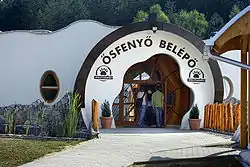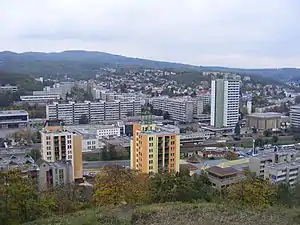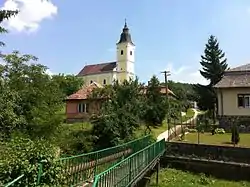Salgótarján District
Salgótarján (Hungarian: Salgótarjáni járás) is a district in north-eastern part of Nógrád County. Salgótarján is also the name of the town where the district seat is found. The district is located in the Northern Hungary Statistical Region.
Salgótarján District
Salgótarjáni járás | |
|---|---|
 Flag  Coat of arms | |
 Salgótarján District within Hungary and Nógrád County. | |
| Country | |
| County | Nógrád |
| District seat | Salgótarján |
| Area | |
| • Total | 525.23 km2 (202.79 sq mi) |
| Area rank | 3rd in Nógrád |
| Population (2011 census) | |
| • Total | 64,601 |
| • Rank | 1st in Nógrád |
| • Density | 123/km2 (320/sq mi) |
Geography
Salgótarján District borders with the Slovakian region of Banská Bystrica to the north, Ózd District (Borsod-Abaúj-Zemplén County) and Bátonyterenye District to the southeast, Pásztó District to the south, Szécsény District to the west. The number of the inhabited places in Salgótarján District is 29.
Municipalities
The district has 1 urban county and 28 villages. (ordered by population, as of 1 January 2013)[1]
- Bárna (1,081)
- Cered (1,122)
- Egyházasgerge (741)
- Etes (1,429)
- Ipolytarnóc (452)
- Karancsalja (1,557)
- Karancsberény (884)
- Karancskeszi (1,905)
- Karancslapujtő (2,651)
- Karancsság (1,242)
- Kazár (1,870)
- Kisbárkány (194)
- Kishartyán (536)
- Litke (885)
- Lucfalva (631)
- Márkháza (252)
- Mátraszele (984)
- Mihálygerge (595)
- Nagybárkány (673)
- Nagykeresztúr (247)
- Rákóczibánya (677)
- Ságújfalu (1,059)
- Salgótarján (37,199) – district and county seat
- Sámsonháza (270)
- Somoskőújfalu (2,280)
- Sóshartyán (955)
- Szilaspogony (296)
- Vizslás (1,347)
- Zabar (490)
The bolded municipality is the city.
Demographics
Religion in Salgótarján District (2011 census)
In 2011, it had a population of 64,601 and the population density was 123/km².
| Year | County population[2] | Change |
|---|---|---|
| 2011 | 64,601 | n/a |
Ethnicity
Besides the Hungarian majority, the main minorities are the Roma (approx. 5,500), Slovak (400) and German (200).
Total population (2011 census): 64,601
Ethnic groups (2011 census):[3] Identified themselves: 62,958 persons:
- Hungarians: 56,484 (89.72%)
- Gypsies: 5,383 (8.55%)
- Others and indefinable: 1,091 (1.73%)
Approx. 1,500 persons in Salgótarján District did not declare their ethnic group at the 2011 census.
Religion
Religious adherence in the county according to 2011 census:[4]
- Catholic – 30,966 (Roman Catholic – 30,846; Greek Catholic – 118);
- Evangelical – 1,182;
- Reformed – 1,136;
- other religions – 1,468;
- Non-religious – 12,682;
- Atheism – 750;
- Undeclared – 16,417.
Gallery
 Downtown of Salgótarján
Downtown of Salgótarján Aerial view of Kazár
Aerial view of Kazár Nature Reserve Ipolytarnóc Fossils
Nature Reserve Ipolytarnóc Fossils
 View of Salgótarján
View of Salgótarján Town Hall in Salgótarján
Town Hall in Salgótarján Conferential Centre (Salgótarján)
Conferential Centre (Salgótarján) All Saints Church in Karancsberény
All Saints Church in Karancsberény
See also
References
- A KSH 2013. évi helységnévkönyve
- népesség.com, "Salgótarjáni járás népessége"
- 4.1.6.1 A népesség nemzetiség szerint, 2011, (in Hungarian)
- 4.1.7.1 A népesség vallás, felekezet szerint, 2011, (in Hungarian)